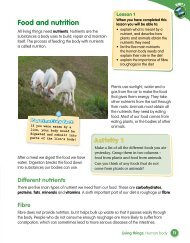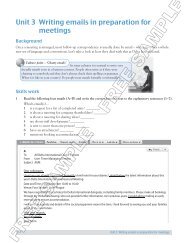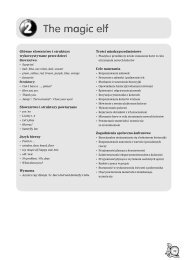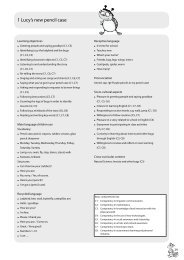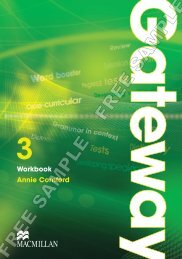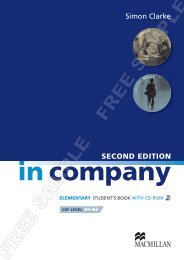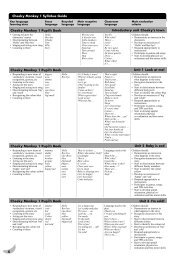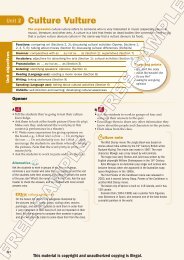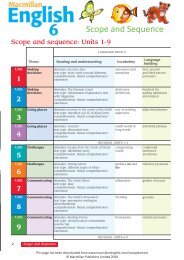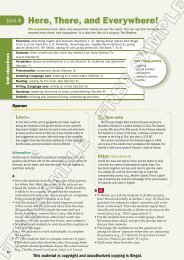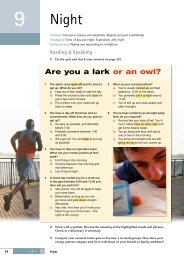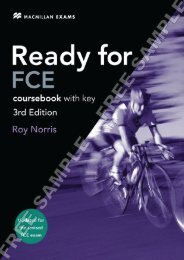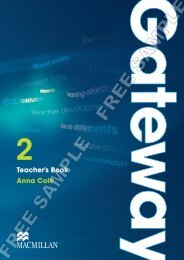fr eesamp le fr eesamp le - Macmillan
fr eesamp le fr eesamp le - Macmillan
fr eesamp le fr eesamp le - Macmillan
Create successful ePaper yourself
Turn your PDF publications into a flip-book with our unique Google optimized e-Paper software.
Opener<br />
EXAM!<br />
1 Why is the woman in the photo wearing a costume<br />
Presentation<br />
2 Read and listen to Carnivals.<br />
1.17<br />
Comprehension<br />
F E S T I V A L S<br />
1 Europe’s best street party<br />
Comparative and superlative adjectives<br />
Making comparisons<br />
EXAM!<br />
3 True or false Correct the false sentences.<br />
1 In Rio each carnival parade lasts 24 hours.<br />
2 At carnival time hotels in Rio are much more<br />
expensive than usual.<br />
3 Carnival in Rio is longer than Notting Hill carnival.<br />
4 Notting Hill carnival is in February or March.<br />
5 The carnival in Notting Hill is <strong>le</strong>ss famous<br />
than the one in Rio.<br />
6 Notting Hill carnival is the biggest in the world.<br />
C a r n i v a l i n R i o<br />
In Brazil, peop<strong>le</strong> ce<strong>le</strong>brate carnival in February or March. Every region<br />
has its own festival, but carnival in Rio is the most famous. It lasts four<br />
days and millions of peop<strong>le</strong> go to it, including 300,000 foreign visitors.<br />
It’s bigger than any other Brazilian carnival – and better, say the cariocas<br />
(the peop<strong>le</strong> of Rio).<br />
There are two nights of parades in the streets and in the giant samba<br />
stadium, which holds 90,000 peop<strong>le</strong>. Some parades have thousands of<br />
dancers, all in the most amazing costumes, and 600 to 800 drummers.<br />
Each parade lasts ten to twelve hours and the judges choose the best<br />
dancers. There are also all-night carnival balls with non-stop loud music.<br />
At carnival, Rio is the most exciting city in the world, but it is also<br />
one of the most expensive – hotels and taxis cost four times as much as<br />
usual. But that’s because Rio has the biggest and most spectacular<br />
carnival in the world!<br />
N o t t i n g H i l l c a r n i v a l<br />
For most of the year, Notting Hill is a smart quiet part of London. But at<br />
carnival time you can see the real cosmopolitan Notting Hill, which is<br />
much more exciting – and noisier!<br />
The Notting Hill carnival is smal<strong>le</strong>r than Rio and <strong>le</strong>ss well-known,<br />
but it’s the largest carnival in Europe. It started in 1964 and now over<br />
a million peop<strong>le</strong> come to the carnival for two days at the end of August<br />
each year. More than fifty bands parade through the streets in colourful<br />
costumes. There are lots of sound systems playing reggae and other kinds<br />
of music, and three stages where bands play. The streets are full of peop<strong>le</strong><br />
dancing and following the bands. And when you get hungry, there are<br />
stalls selling exotic food <strong>fr</strong>om all over the world.<br />
They call Notting Hill carnival ‘The Greatest Show on Earth’. It’s<br />
Europe’s best street party! And it’s <strong>le</strong>ss expensive than Rio!<br />
20<br />
FREE SAMPLE FREE SAMPLE
Grammar<br />
4 Comp<strong>le</strong>te.<br />
Adjective Comparative Superlative<br />
small small the smal<strong>le</strong>st<br />
large larger the<br />
big<br />
big<br />
noisy<br />
the noisiest<br />
famous more famous the famous<br />
exciting exciting the exciting<br />
Irregular<br />
good<br />
the best<br />
bad worse the worst<br />
The opposite of more is .<br />
The opposite of most is <strong>le</strong>ast.<br />
Grammar Practice<br />
Check the answers: Grammar Summary page 110<br />
EXAM!<br />
5 Comp<strong>le</strong>te with comparative or superlative adjectives.<br />
1 The carnival in Rio is than Notting Hill<br />
carnival. (large)<br />
2 The Notting Hill carnival is the carnival in<br />
Europe. (big)<br />
3 Cariocas think that Rio has the carnival in<br />
the world. (good)<br />
4 Rio is the carnival in the world. (exciting)<br />
5 It’s for Europeans to go to the Notting Hill<br />
Carnival. (expensive)<br />
6 Pedro is a dancer than Jack. (good)<br />
7 Jack isn’t the dancer in the world! (bad)<br />
8 The carnival parades in Rio last than in<br />
Notting Hill. (long)<br />
9 The place in Rio at carnival time is the giant<br />
samba stadium. (noisy)<br />
10 Peop<strong>le</strong> who don’t have a lot of money look for the<br />
hotel. (expensive)<br />
Game<br />
6 Say the comparative and superlative adjectives.<br />
Writing<br />
7 Read CARNIVALS again and comp<strong>le</strong>te the chart for Rio<br />
and Notting Hill.<br />
When<br />
How long<br />
How many<br />
peop<strong>le</strong><br />
What kind<br />
of music<br />
What’s special<br />
about it<br />
Rio Notting Hill Your festival<br />
Now comp<strong>le</strong>te the chart for a festival you know about<br />
(in your country or another one).<br />
Speaking<br />
8 Look at the chart in exercise 7, and compare the two<br />
carnivals and your festival.<br />
Pronunciation<br />
9 Listen and repeat. Then circ<strong>le</strong> the /´/ sound.<br />
1.18<br />
Speaking<br />
/´/ better<br />
carnival colourful dancer famous longer<br />
parade region samba special thousand<br />
10 Compare three cities in your country. Think about:<br />
Writing<br />
Good.<br />
Better, best.<br />
EXAM!<br />
EXAM!<br />
The carnival in Rio lasts longer<br />
than the Notting Hill carnival.<br />
EXAM!<br />
age (old) size (big) peop<strong>le</strong> (nice)<br />
festivals weather (warm/cold, dry/wet)<br />
shopping sport (football teams) food<br />
EXAM!<br />
Two points!<br />
The carnival in my country is smal<strong>le</strong>r<br />
than Rio, but it is one of the most …<br />
I think Barcelona is older than Madrid.<br />
I think Granada is the oldest city in Spain.<br />
11 Write sentences about cities in your country.<br />
Barcelona is bigger than Granada, but Madrid is the<br />
biggest city.<br />
FREE SAMPLE FREE SAMPLE<br />
U N I T<br />
21
Opener<br />
EXAM!<br />
1 Which of these can you see in the photo<br />
a band a cap a bag jewel<strong>le</strong>ry signs<br />
a stage stalls trainers umbrellas<br />
Presentation<br />
2 Read and listen.<br />
1.19<br />
GREG It’s really easy to get lost here. We should stay<br />
together. Where are Carol, Pedro and Jack<br />
SALLY They’re dancing next to the band – in <strong>fr</strong>ont of<br />
the Mexican food stall.<br />
GREG Hey, you three – come here! You shouldn’t go<br />
away like that.<br />
CAROL Why not It’s a carnival. We’re on holiday.<br />
GREG You should tell me where you’re going. I’m<br />
looking after you.<br />
CAROL I can look after myself. Bye!<br />
BEN Carol, you shouldn’t go off on your own – it<br />
isn’t safe. I’m coming with you!<br />
GREG Now listen, the rest of you. Stay together and<br />
meet me in half an hour at the YTV stage. It’s<br />
opposite the cinema. OK Carol, Ben, come back!<br />
Comprehension<br />
F E S T I V A L S<br />
2 We should stay together<br />
3 Answer the questions.<br />
should and shouldn’t<br />
Prepositions of place<br />
Giving advice<br />
Talking about town facilities<br />
EXAM!<br />
1 Who is dancing next to the band<br />
2 Why should they tell Greg where they are going<br />
3 Does Carol agree with Greg<br />
4 Why does Ben go with Carol<br />
5 When does Greg ask the others to meet him<br />
6 What is opposite the cinema<br />
22<br />
Grammar<br />
4 Comp<strong>le</strong>te.<br />
should and shouldn’t<br />
We should stay together.<br />
You tell me where you’re going.<br />
You go off on your own.<br />
Why they tell Greg<br />
Grammar Practice<br />
Check the answers: Grammar Summary page 110<br />
EXAM!<br />
5 Read Carnival Dos and Don’ts. Then comp<strong>le</strong>te the<br />
sentences with should or shouldn’t.<br />
C A R N I V A L<br />
Dos and Dont’s<br />
✗ Don’t carry lots of money.<br />
✓ Walk in the same direction as the crowd.<br />
✗ Don’t jump in <strong>fr</strong>ont of a band – follow it.<br />
✓ Look after children.<br />
✗ Don’t wear expensive jewel<strong>le</strong>ry.<br />
1 You carry lots of money.<br />
2 You look after children.<br />
3 You jump in <strong>fr</strong>ont of a band.<br />
4 You wear expensive jewel<strong>le</strong>ry.<br />
5 You walk in the same direction as the crowd.<br />
FREE SAMPLE FREE SAMPLE
Speaking<br />
6 Read the YTV questionnaire. What<br />
should/shouldn’t you do in your<br />
country<br />
Writing<br />
EXAM!<br />
EXAM!<br />
7 Write a paragraph giving advice<br />
to a visitor to your country. Use<br />
the topics in the questionnaire<br />
and add others.<br />
When you visit someone’s home for<br />
the first time, you should take<br />
flowers.<br />
Pronunciation<br />
8 Listen and repeat.<br />
1.20<br />
/s/<br />
/S/<br />
She’s got sixty shirts and sixty-six<br />
skirts – she should stop shopping!<br />
Grammar Practice<br />
9 Look at the photo on page 22 and<br />
comp<strong>le</strong>te with prepositions <strong>fr</strong>om<br />
the box.<br />
1 Tomek is standing Gabi.<br />
2 Greg is standing the<br />
group.<br />
3 Gabi is Tomek and Laura.<br />
4 Ben is Greg.<br />
5 Sally is Ben.<br />
6 The woman in red is dancing<br />
Greg.<br />
Vocabulary<br />
EXAM!<br />
EXAM!<br />
10 Ask and answer questions about<br />
the High Street.<br />
Where’s the post office<br />
Q U E S T I O N N A I R E<br />
What should/shouldn’t you do when …<br />
U N I T<br />
1 … you visit someone’s home for the first time<br />
A Take flowers.<br />
B Arrive half an hour early.<br />
4 … you answer the te<strong>le</strong>phone<br />
C Arrive a litt<strong>le</strong> late.<br />
A Say hello.<br />
D Take your own food with you.<br />
B Say your name.<br />
2 … you meet someone’s parents C Say your number.<br />
A Kiss them once on the cheek. D Say your address.<br />
B Kiss them twice on the cheek.<br />
5 … you are a guest at a meal<br />
C Shake hands.<br />
A Start eating first.<br />
3 … someone gives you a present B Wait until others are eating.<br />
A Say thank you and open it immediately.<br />
B Say thank you and open it later.<br />
C Eat everything on your plate.<br />
D Leave some food on your plate.<br />
It’s opposite the bank.<br />
TRAVEL AGENCY HAIRDRESSER’S BANK NEWSAGENT’S CHEMIST’S<br />
CAFÉ<br />
You should take flowers.<br />
FLOWER SHOP<br />
Prepositions of place<br />
SUPERMARKET POLICE STATION POST OFFICE BOOKSHOP HOTEL<br />
over<br />
in <strong>fr</strong>ont of<br />
inside<br />
next to<br />
under<br />
behind<br />
outside<br />
near<br />
between<br />
opposite<br />
Grammar Summary page 111<br />
Ro<strong>le</strong> Play<br />
11 Act out a conversation between<br />
a visitor and a local (someone who<br />
knows the street). You can use the<br />
phrases in the boxes.<br />
Visitor<br />
Writing<br />
EXAM!<br />
Say Excuse me.<br />
Local<br />
Ask Where can I …<br />
Say Thank you.<br />
Ask Can I help<br />
Answer.<br />
Visitor<br />
Where can I …<br />
buy some medicine<br />
buy some stamps<br />
find the police<br />
book a flight<br />
buy some flowers<br />
get some bread<br />
get a haircut<br />
change some money<br />
get a cup of coffee<br />
buy some magazines<br />
Local<br />
The … is<br />
near … next to …<br />
opposite … between …<br />
over … under …<br />
EXAM!<br />
12 Write conversations between<br />
a local and two visitors. Use the<br />
phrases in the boxes in exercise 11.<br />
FREE SAMPLE FREE SAMPLE<br />
23
Opener<br />
1 Where are Ben and Carol dancing Which kinds<br />
of music do you like dancing to<br />
Music<br />
heavy metal house jazz pop punk rap<br />
reggae rock soul techno world<br />
Presentation<br />
2 Read and listen.<br />
1.21<br />
Ben and Carol are at Notting Hill carnival.<br />
BEN You’re really good at dancing! What else do you<br />
enjoy doing<br />
CAROL Oh, I don’t know. Lots of things.<br />
BEN What kind of things Being rude to peop<strong>le</strong><br />
CAROL I don’t enjoy being rude!<br />
BEN Yes, you do! You were rude to Greg just now.<br />
CAROL Well, he’s bossy. I’m not interested in listening<br />
to bossy peop<strong>le</strong>.<br />
BEN What do you like doing<br />
CAROL I love going to festivals – this carnival is<br />
fantastic.<br />
BEN I quite like festivals too, but there are too many<br />
peop<strong>le</strong> here. I don’t like being in large crowds.<br />
CAROL But peop<strong>le</strong> don’t notice you in a crowd. I don’t<br />
like looking stupid, so I enjoy being in a crowd.<br />
What other things don’t you like<br />
BEN Oh, I can’t stand waiting for peop<strong>le</strong>. And I like<br />
knowing where I am.<br />
CAROL What do you mean<br />
BEN I hate being lost. And I think we’re lost now!<br />
Comprehension<br />
3 Comp<strong>le</strong>te.<br />
1 Carol is at dancing.<br />
2 She doesn’t being rude.<br />
3 She isn’t in listening to bossy peop<strong>le</strong>.<br />
4 Both Carol and Ben like going to .<br />
5 hates being in large crowds.<br />
6 doesn’t like looking stupid.<br />
7 Ben can’t waiting for peop<strong>le</strong>.<br />
8 Ben being lost.<br />
Listening<br />
3 I love going to festivals<br />
EXAM!<br />
F E S T I V A L S<br />
Verb/Preposition + gerund<br />
Talking about likes and dislikes<br />
Talking about ability<br />
EXAM!<br />
4 Are Carol and Ben lost Listen and find out.<br />
1.22<br />
24<br />
Grammar<br />
5 Comp<strong>le</strong>te.<br />
Verb + gerund<br />
I love going to festivals.<br />
I hate be lost.<br />
I don’t enjoy rude.<br />
I can’t stand for peop<strong>le</strong>.<br />
What do you like <br />
Preposition + gerund<br />
You’re good at dancing.<br />
I’m not interested listening to bossy peop<strong>le</strong>.<br />
Check the answers: Grammar Summary page 111<br />
FREE SAMPLE FREE SAMPLE
Grammar Practice<br />
EXAM!<br />
6 Comp<strong>le</strong>te with the correct form of the verb.<br />
1 He likes where he is. (know)<br />
2 She’s good at . (dance)<br />
3 What do you hate (do)<br />
4 Who can’t stand for peop<strong>le</strong> (wait)<br />
5 Does she enjoy rude to peop<strong>le</strong> (be)<br />
6 They love to reggae. (listen)<br />
7 Paula is interested in to the competition<br />
winners. (talk)<br />
8 We aren’t bad at English! (speak)<br />
U N I T<br />
7 Look back at exercises 2 and 6, and add the correct<br />
preposition.<br />
1 interested sightseeing<br />
2 rude peop<strong>le</strong><br />
3 bad singing<br />
4 listen music<br />
5 wait someone<br />
6 talk someone<br />
7 good playing the guitar<br />
Pronunciation<br />
8 Listen and repeat. Mark the stress.<br />
1.23<br />
cinema competition enjoy fantastic festival<br />
hairdresser interested interview notice<br />
cinema<br />
Listening<br />
9 Listen to Paula’s interviews and comp<strong>le</strong>te the chart for<br />
Carol and Jack. Use these phrases.<br />
1.24<br />
dancing going to the cinema losing things<br />
going to the hairdresser shopping swimming<br />
talking to girls using computers<br />
Loves<br />
Hates<br />
Good at<br />
Bad at<br />
Speaking<br />
Carol Jack Another student<br />
shopping<br />
10 Interview another student and comp<strong>le</strong>te the chart.<br />
Writing<br />
EXAM!<br />
EXAM!<br />
What do you love/hate doing<br />
EXAM!<br />
What are you good/bad at<br />
11 Write sentences about Carol and Jack using the<br />
information in the chart. Then write about the student<br />
you interviewed.<br />
Carol loves shopping, but she hates …<br />
She’s good at …<br />
She’s bad at …<br />
Now write about things you love and hate, and what<br />
you are good and bad at.<br />
FREE SAMPLE FREE SAMPLE<br />
25
B<br />
D<br />
26<br />
C<br />
F<br />
F E S T I V A L S<br />
4 Integrated Skills<br />
Ce<strong>le</strong>brations<br />
E<br />
A<br />
New Year Around the World<br />
HERE ARE SOME AMAZING NEW YEAR FACTS!<br />
The Chinese ce<strong>le</strong>brate the start of the Chinese New<br />
Year in January or February and it is the longest, the<br />
noisiest and the most exciting holiday of the year. On<br />
New Year’s Eve all the children wear new clothes and<br />
everyone eats special food. New Year ce<strong>le</strong>brations last<br />
15 days, and there are dragon parades and lion<br />
dances in the streets.<br />
In Brazil, peop<strong>le</strong> wear white clothes on New Year’s<br />
Eve (31 December) because it brings good luck. At<br />
midnight peop<strong>le</strong> go to the beach and jump over the<br />
waves seven times. Then they throw flowers into the<br />
sea and make wishes for the new year. Some peop<strong>le</strong><br />
light cand<strong>le</strong>s and there are lots of parties.<br />
One of the most unusual festivals is in Thailand.<br />
Peop<strong>le</strong> ce<strong>le</strong>brate the Thai New Year on 13 April with<br />
‘Song Klarn Day’. On this day peop<strong>le</strong> play games with<br />
water and throw it over each other! They also visit<br />
their grandparents and ask them for good luck.<br />
In Japan most peop<strong>le</strong> ce<strong>le</strong>brate New Year with their<br />
family. They eat special nood<strong>le</strong>s on 31 December, and<br />
at midnight they listen to the bells, which ring 108<br />
times. On New Year’s Day everyone drinks sake,<br />
traditional Japanese rice wine, and eats a special kind<br />
of soup. The children get red envelopes with money<br />
inside, and everyone sends New Year greetings cards.<br />
On 31 December in Venezuela, peop<strong>le</strong> wear yellow<br />
underwear to bring good luck! At midnight they<br />
listen to the church bells and drink champagne. Each<br />
time they hear the bell they eat a grape and make a<br />
wish. Peop<strong>le</strong> who want to travel in the new year carry<br />
a suitcase around the house. Other peop<strong>le</strong> write their<br />
wishes in a <strong>le</strong>tter, and then burn it.<br />
Like many other European countries, Italy ce<strong>le</strong>brates<br />
the arrival of the new year with fireworks. On New<br />
Year’s Eve everyone eats <strong>le</strong>ntils at a large meal that<br />
starts late in the evening and goes on even later.<br />
Some peop<strong>le</strong> also put <strong>le</strong>ntils in their purse or wear<br />
red clothes for good luck. Another tradition is to put<br />
a cand<strong>le</strong> in the window for every member of the<br />
family.<br />
FREE SAMPLE FREE SAMPLE
Opener<br />
1 Guess: Where are the festivals in the photos on<br />
page 26<br />
Reading<br />
2 Read the descriptions of New Year and match the<br />
paragraphs with the photos.<br />
1.25<br />
Now answer these questions.<br />
1 Where do peop<strong>le</strong> eat special nood<strong>le</strong>s at New Year<br />
2 Where do peop<strong>le</strong> drink champagne<br />
3 What do peop<strong>le</strong> in Brazil wear at New Year<br />
4 What else do peop<strong>le</strong> in Brazil do at New Year<br />
5 Where do peop<strong>le</strong> eat <strong>le</strong>ntils at New Year<br />
6 When do they ce<strong>le</strong>brate New Year in Thailand<br />
7 How long do New Year ce<strong>le</strong>brations last in China<br />
8 Where are fireworks important at New Year<br />
Where do peop<strong>le</strong> eat grapes at New Year<br />
What do peop<strong>le</strong> in Venezuela wear at New Year<br />
Then ask and answer similar questions.<br />
Listening<br />
EXAM!<br />
3 Paula talks about New Year in England. Listen and<br />
choose the correct answer.<br />
1.26<br />
1 What do peop<strong>le</strong> often do on New Year’s Eve<br />
A have parties B go on holiday<br />
2 What do they do at midnight<br />
A go to London B listen to Big Ben<br />
3 What do they do after midnight<br />
A shake hands B sing a song<br />
4 What do peop<strong>le</strong> drink<br />
A champagne B tea<br />
5 What do they say to each other<br />
A Good luck! B Happy New Year!<br />
Speaking<br />
EXAM!<br />
EXAM!<br />
EXAM!<br />
4 Look at the questions in exercise 3. Ask another<br />
student about New Year’s Eve in their country.<br />
Writing<br />
U N I T<br />
5 Write a paragraph about New Year’s Eve in your<br />
country. Use the texts in this <strong>le</strong>sson to help you.<br />
Notice that the texts usually:<br />
● begin by giving the name of the country and festival<br />
and the date<br />
● continue by describing food and drink, and what<br />
peop<strong>le</strong> do<br />
● sometimes talk about children and presents<br />
● use prepositions of time:<br />
on (date) in (month) at (time)<br />
Real English<br />
6 The <strong>le</strong>tters of the highligted word in each phrase are<br />
mixed up. Write the correct version. How fast can you<br />
correct the mistakes<br />
1.27<br />
1 Emco here!<br />
2 Hyw not<br />
3 Dogo luck.<br />
4 What do you name<br />
5 I’m mocing with you.<br />
6 Now tensil!<br />
7 Oh, I don’t wonk.<br />
8 What kind of singth<br />
9 Sey, you do!<br />
10 It isn’t efas.<br />
Listen and repeat.<br />
EXAM!<br />
7 Put the jumb<strong>le</strong>d sentences of the dialogue in order.<br />
The first sentence has been done for you.<br />
■ Wait, I’m not scared. I’m coming with you.<br />
■ What do you mean What kind of things<br />
■ Let’s go then!<br />
■ I don’t believe in ghosts. But if you're scared, I’m<br />
going on my own.<br />
■ But I’m telling you it’s dangerous. Strange things<br />
happen inside.<br />
■1<br />
Hey, Steve, come here at once! You shouldn’t go<br />
inside that building.<br />
■ Oh, I don’t know. You can hear strange voices and<br />
sometimes even see a ghost.<br />
■ Why not There’s no sign here saying that it isn’t<br />
safe.<br />
Unit 2 Communication Activity<br />
Student A page 106<br />
Student B page 116<br />
EXAM!<br />
FREE SAMPLE FREE SAMPLE<br />
27
Słuchanie<br />
1.28<br />
1.28<br />
28<br />
F E S T I V A L S<br />
1 Dopasuj czynności do miejsc podanych w ramce.<br />
bank bookshop chemist’s flower shop<br />
hairdresser’s newsagent’s police station<br />
post office supermarket travel agency<br />
a get some aspirin and vitamins<br />
b buy a dictionary<br />
c buy a stamp and an envelope<br />
d buy some roses<br />
e change some money<br />
f get a haircut<br />
g report a crime<br />
h get a newspaper<br />
i buy food and clothes<br />
j book a trip<br />
2 Usłyszysz dwukrotnie pięć dialogów.<br />
Przyporządkuj każdej rozmowie (1–5) miejsce,<br />
w którym się ona odbywa.<br />
B<br />
D<br />
1 ■<br />
2 ■<br />
3 ■<br />
4 ■<br />
5 ■<br />
3 Posłuchaj dialogów jeszcze raz. Zanotuj<br />
słowa klucze, dzięki którym wybrałeś/wybrałaś<br />
poszczególne miejsca w ćwiczeniu 2.<br />
1<br />
2<br />
3<br />
4<br />
5<br />
A<br />
C<br />
E<br />
EXAM!<br />
R E V I S I O N<br />
4 Usłyszysz dwukrotnie pięć krótkich wypowiedzi (1–5).<br />
Do każdej z nich dobierz właściwą reakcję (a–f). Jedna reakcja<br />
została podana dodatkowo i nie pasuje do żadnej wypowiedzi.<br />
1.29<br />
1 ■ a Do you I think it’s <strong>le</strong>ss exciting than the one in Rio.<br />
2 ■ b Go straight ahead and turn <strong>le</strong>ft. It’s next to the<br />
3 ■ flower shop.<br />
4 ■ c Yes, you do! You danced all night with Tom yesterday!<br />
5 ■ d Why not There’s a present for me in it.<br />
e I think this agency isn’t too good.<br />
f Oh, I don’t know. Lots of things.<br />
Reagowanie j´zykowe<br />
5 Odpowiedz na pytania, używając wyrażeń z ramek.<br />
cake cand<strong>le</strong>s dance excited great<br />
happy make a wish play games presents<br />
1 What things do you need for a birthday party<br />
2 What do you do at a birthday party<br />
3 How do you feel at a birthday party<br />
6 Przyjrzyj się ilustracji.<br />
Odpowiedz po angielsku<br />
na pytania 1–3. Udziel<br />
odpowiedzi pełnymi zdaniami.<br />
1 What are the peop<strong>le</strong> in<br />
the picture doing<br />
2 What are they wearing<br />
3 How do you usually<br />
ce<strong>le</strong>brate your birthday<br />
7 Przeprowadź wywiad z ko<strong>le</strong>gą/ko<strong>le</strong>żanką na temat sposobu,<br />
w jaki obchodzi on/ona swoje urodziny. Ułóż pytania zaczynające<br />
się od: How/How many/What time/What kind/What/Why.<br />
Czytanie<br />
8 Przeczytaj zdania i wybierz właściwe tłumaczenie wyróżnionych<br />
słów.<br />
1 My brother enjoyed his stay in London very much because<br />
his English hosts were very <strong>fr</strong>iendly and he had a very nice<br />
room in their house.<br />
właÊcicie<strong>le</strong>/mieszkaƒcy/gospodarze<br />
2 There’s a custom in Poland that Santa Claus brings presents<br />
on 6th December and on the night before Christmas.<br />
przesàd/zwyczaj/wyjàtek<br />
3 Don’t wipe your dirty hands on your trousers – go and<br />
wash them!<br />
wycieraç/praç/myç<br />
4 He always greets his <strong>fr</strong>iends with a loud ‘Hello!’.<br />
wita/˝egna/zaczepia<br />
5 Turn on the cold tap and give me a glass of water, p<strong>le</strong>ase.<br />
butelka/kran/prysznic<br />
FREE SAMPLE FREE SAMPLE
9 Przeczytaj poniższy tekst. Podkreśl w nim słowa<br />
wyróżnione w ćwiczeniu 8. Następnie z podanych<br />
odpowiedzi (A, B, C) wybierz jedną, zgodną z treścią<br />
tekstu.<br />
When you come to Britain you should know that<br />
British customs are different <strong>fr</strong>om Polish ones.<br />
It’s better to arrive a few minutes late when the<br />
British invite you to their home for a meal. And<br />
when you get inside, you shouldn’t take off your<br />
shoes. It’s enough to wipe them well on the doormat.<br />
If you are a good <strong>fr</strong>iend of your hosts, they may<br />
greet you with a kiss or two, but you shouldn’t<br />
expect three kisses, like in Poland.<br />
The British drink a lot of tea and they usually<br />
have it with milk. Even if you drink yours black<br />
with sugar and <strong>le</strong>mon, you should try English-sty<strong>le</strong><br />
tea. You won’t regret it. And if you don’t know what<br />
to say, remember that the weather is the safest topic<br />
for conversation in Britain.<br />
You may find a strange thing in a British home –<br />
two separate taps for cold and hot water. So before<br />
you wash your hands, mix hot and cold water in the<br />
washbasin. The good news is that it’s safe to drink<br />
tap water almost everywhere.<br />
The most important thing is to keep your eyes<br />
open. Watch what the British do, and do the same.<br />
Then you won’t do anything wrong.<br />
1 The author of the text wants Polish visitors in<br />
Britain to ...<br />
A have a good meal.<br />
B remember some British customs.<br />
C forget some Polish customs.<br />
2 When you visit a British home, you should be ...<br />
A very punctual.<br />
B a litt<strong>le</strong> early.<br />
C a litt<strong>le</strong> late.<br />
3 When the British greet their <strong>fr</strong>iends they ...<br />
A never kiss them.<br />
B kiss them once or twice.<br />
C kiss them three times.<br />
4 In Britain you should try ...<br />
A black tea.<br />
B tea with milk.<br />
C <strong>le</strong>mon with sugar.<br />
5 In many British homes ...<br />
A you wash your hands in cold water.<br />
B you can’t drink tap water.<br />
C there are hot and cold water taps.<br />
Czytanie<br />
10 Podkreśl w tekście te <strong>fr</strong>agmenty, które pomogły<br />
ci wybrać właściwą odpowiedź na pytania (1–5)<br />
w ćwiczeniu 9.<br />
E X T E N S I O N<br />
A<br />
L E S S O N 1<br />
U N I T<br />
Compare the three cities/towns in the pictures. Write<br />
about the size of each place, its age, peop<strong>le</strong> and<br />
buildings. Which picture do you like the best and why<br />
The city in picture A is larger than the city in picture C,<br />
but the one in picture B is the largest. I like picture …<br />
best because …<br />
L E S S O N 2<br />
An American tourist has a list of things he should do<br />
to be polite in Poland. Unfortunately not everything<br />
is correct. Put (✓✓) next to the things most Po<strong>le</strong>s do,<br />
(✓) next to the things some Po<strong>le</strong>s do and (✗) next to<br />
the things that are not polite in Poland. Add some<br />
more points to the list.<br />
1 A man should kiss a woman on the hand when he<br />
greets her.<br />
2 A man should enter a room before a woman.<br />
3 You should say ‘thank you’ when you finish the<br />
meal.<br />
4 You should take off your shoes when you enter<br />
somebody’s home.<br />
5 …<br />
L E S S O N 3<br />
You are looking for the ideal member for your new<br />
band. Write what this person likes, enjoys, dislikes<br />
and hates doing, and what he/she should be good<br />
at or interested in.<br />
L E S S O N 4<br />
Write a list of questions to find out about your partner’s<br />
favourite festival or ce<strong>le</strong>bration. Interview your partner.<br />
FREE SAMPLE FREE SAMPLE<br />
C<br />
B<br />
29
Grammar<br />
EXAM!<br />
1 Read and comp<strong>le</strong>te. For each number 1–12, choose<br />
word A, B, or C.<br />
LONDON CELEBRATIONS<br />
Some of London’s many ce<strong>le</strong>brations are very British,<br />
but others, like the Notting Hill carnival, 1 that<br />
London 2 very cosmopolitan.<br />
Up to 100,000 peop<strong>le</strong> ce<strong>le</strong>brate the Chinese New<br />
Year in London’s West End in January or February.<br />
There are lion dances, fireworks and stages with<br />
traditional Chinese music and dance. It is the 3<br />
important festival of the Chinese year.<br />
A popular parade with lots of stalls and stages<br />
4 at Easter in Battersea Park in south-west<br />
London.<br />
Tourists 5 try to see ‘The Trooping of the<br />
Colour’ in June. The Queen 6 in an open carriage,<br />
and watches a 7 of soldiers 8 Buckingham<br />
Palace in central London.<br />
There are fireworks in Southall in west London in<br />
October when Hindus ce<strong>le</strong>brate Diwali, the Hindu<br />
festival of lights. This festival is also the start of the<br />
Hindu New Year and lots of families enjoy 9 the<br />
ce<strong>le</strong>brations.<br />
Guy Fawkes’ Night with bonfires and fireworks is<br />
on 5 November. Peop<strong>le</strong> ce<strong>le</strong>brate Guy Fawkes’ failure<br />
to kill the King in 1605. Many children think this is the<br />
10 night of the year!<br />
Finally, 11 Christmas there is a huge Christmas<br />
tree in Trafalgar Square. It is a present <strong>fr</strong>om Norway<br />
and it is the 12 famous Christmas tree in Britain.<br />
1 A show B shows C are showing<br />
2 A are B have C is<br />
3 A more B most C much<br />
4 A ce<strong>le</strong>brates B goes C happens<br />
5 A should B shouldn’t C don’t<br />
6 A ride B rides C is riding<br />
7 A dance B parade C walk<br />
8 A on B off C near<br />
9 A watch B to watch C watching<br />
10 A most B best C better<br />
11 A at B in C on<br />
12 A much B more C most<br />
30<br />
2 Comp<strong>le</strong>te with the correct form of the present simp<strong>le</strong><br />
of these verbs.<br />
be chat do drink eat get go<br />
like phone play speak watch<br />
1 In the evening Gabi online to her <strong>fr</strong>iends.<br />
2 I (not) interested in going to the cinema.<br />
3 Laura TV every evening.<br />
4 Pedro four languages<br />
5 Sally her parents every day.<br />
6 Carol (not) pigeons.<br />
7 I swimming on Mondays.<br />
8 Tomek coffee at breakfast<br />
9 Jack (not) aerobics.<br />
10 Carol never chips.<br />
11 Ben (not) vol<strong>le</strong>yball.<br />
12 The children envelopes with money inside.<br />
3 Comp<strong>le</strong>te with the correct form of the present<br />
continuous of these verbs.<br />
drink hold listen look make tell<br />
1 Kate the group about the YTV film.<br />
2 Greg Kate’s coffee<br />
3 Tomek at his map.<br />
4 Pedro and Gabi hands<br />
5 The actors a film about pickpockets.<br />
6 you to me<br />
4 Write questions and answers.<br />
camera/Pedro<br />
Whose camera is this It’s Pedro’s. It’s his.<br />
1 watch/Tomek<br />
2 map/Carol<br />
3 book/Gabi<br />
4 YTV badge/Greg<br />
5 videos/my parents<br />
6 sandwiches/the dancers<br />
5 Comp<strong>le</strong>te with comparative or superlative adjectives.<br />
1 The Rio carnival is carnival in the world.<br />
(large)<br />
2 Notting Hill carnival is street party in<br />
Europe. (exciting)<br />
3 Carol is a dancer than Ben. (good)<br />
4 Jack is than Ben at talking to girls. (bad)<br />
5 Who is singer in the world (popular)<br />
6 London is city in Britain. (big)<br />
7 Hotels in Rio are at carnival time. (expensive)<br />
8 The Notting Hill carnival is than the Rio<br />
carnival. (well-known)<br />
FREE SAMPLE FREE SAMPLE
6 Rewrite this safety advice using should and shouldn’t.<br />
When you go out in the evening …<br />
● Never take lifts <strong>fr</strong>om strangers, or get into a<br />
stranger’s car.<br />
● Don’t stay out very late and don’t walk home<br />
on your own.<br />
● Remember to carry a mobi<strong>le</strong> or a phone card<br />
for a public phone.<br />
● Make sure you’ve got enough money for a taxi<br />
home if necessary.<br />
● Don’t forget to check the times of the last<br />
trains and buses.<br />
You shouldn’t take lifts <strong>fr</strong>om strangers …<br />
7 Look at the photo on page 11 and comp<strong>le</strong>te with these<br />
words.<br />
behind between in <strong>fr</strong>ont of<br />
next to outside over<br />
1 Greg is standing Laura and Tomek.<br />
2 Gabi is standing Pedro.<br />
3 The group are a shop in Covent Garden.<br />
4 There are some flowers Tomek’s head.<br />
5 The tall man is the girl in the red hat.<br />
6 Jack is standing the tall man.<br />
8 Comp<strong>le</strong>te with the gerund of these verbs.<br />
be (x3) buy dance go look talk wait<br />
1 Ben doesn’t like in large crowds.<br />
2 Carol is good at to all kinds of music.<br />
3 Ben can’t stand for peop<strong>le</strong>.<br />
4 Carol doesn’t like stupid.<br />
5 Jack thinks he’s bad at to girls.<br />
6 Carol doesn’t enjoy rude to peop<strong>le</strong>.<br />
7 Jack likes to the cinema.<br />
8 Carol loves presents.<br />
9 Ben hates lost.<br />
Vocabulary<br />
9 Comp<strong>le</strong>te with these nouns.<br />
actor busker <strong>fr</strong>iend guide<br />
pickpocket scriptwriter<br />
1 A sings in the street.<br />
2 An plays peop<strong>le</strong> in films.<br />
3 A shows tourists around.<br />
4 A steals things <strong>fr</strong>om peop<strong>le</strong>’s pockets.<br />
5 A is someone you know and like.<br />
6 A writes films.<br />
10 Match these words with their definitions.<br />
briefcase cand<strong>le</strong> chemist’s costume joke<br />
newsagent’s outside parade remember scarf<br />
1 something you burn to give light<br />
2 something you wear round your neck<br />
3 when peop<strong>le</strong> walk or dance in the street at a carnival<br />
4 short funny story<br />
5 shop where you can buy medicine<br />
6 shop where you can buy newspapers<br />
7 opposite of inside<br />
8 clothes you wear in a play or at a carnival<br />
9 peop<strong>le</strong> carry this bag to work<br />
10 opposite of forget<br />
11 Match the verbs in list A with the words and phrases in<br />
list B.<br />
A<br />
B<br />
1 change ■ a hands<br />
2 chat ■ b a language<br />
3 do ■ c online<br />
4 hold ■ d aerobics<br />
5 make ■ e games<br />
6 play ■ f glasses<br />
7 speak ■ g some money<br />
8 stay at ■ h a joke<br />
9 tell ■ i a hotel<br />
10 wear ■ j a wish<br />
12 Find the odd word.<br />
1 cost band parade stage<br />
2 expensive famous exciting costume<br />
3 under street behind opposite<br />
4 carnival hotel festival party<br />
5 newsagent’s supermarket chemist’s bank<br />
6 rude bossy angry happy<br />
P R O G R E S S C H E C K<br />
Now you can …<br />
1 Talk about states and routines<br />
2 Describe what’s happening now<br />
3 Express possession<br />
4 Make comparisons<br />
5 Give advice<br />
6 Talk about town facilities<br />
7 Talk about likes and dislikes<br />
8 Talk about ability<br />
Look back at Units 1 and 2 and write an examp<strong>le</strong><br />
for 1–8.<br />
1 I go to the cinema on Saturdays.<br />
How good are you Tick a box.<br />
★★★ Fine ■ ★★ OK ■ ★ Not sure ■<br />
Not sure about something Have a look at the<br />
Grammar Summary.<br />
FREE SAMPLE FREE SAMPLE<br />
31



